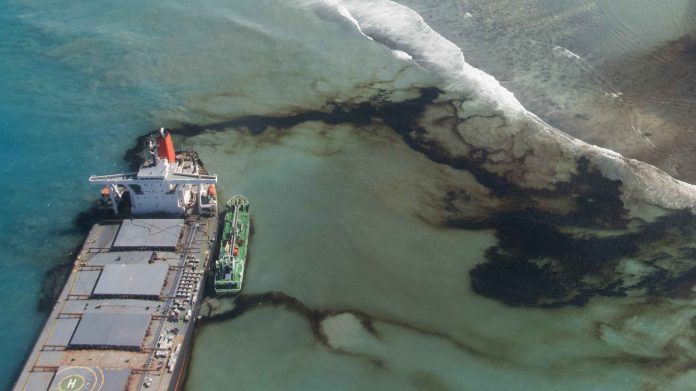
By MARI YAMAGUCHI
Associated Press
TOKYO (AP) — The Japanese operator of a bulk carrier that struck a coral reef and caused an extensive oil spill off the coast of Mauritius said Friday that the accident occurred after the ship shifted its course two miles (3.2 kilometers) closer to shore than planned so its crewmembers could get cellphone signals.
Mitsui O.S.K. Lines said its investigation showed the accident was caused by human error, including inadequate nautical charts, navigation systems and risk awareness, and a lack of supervision and safety monitoring.
The company said the tanker’s nautical chart provided little information about depth and other necessary information. Crewmembers on duty also failed to conduct safety checks visually or by radar, it said.
The captain and crewmembers were also using their cellphones while on duty, the company said.
It said it will invest about 500 million yen ($4.8 million) to provide electronic nautical charts, training to strengthen safety culture and other systems to enhance safety.
The environmental disaster began July 25 when the ship MV Wakashio strayed off course and struck a coral reef a mile (1.6 kilometers) offshore. After being pounded by heavy surf for nearly two weeks, the ship’s hull cracked and on Aug. 6 began leaking fuel into a lagoon, polluting a protected wetlands area and a bird and wildlife sanctuary.
The company apologized for the damage and in September offered 1 billion yen ($9 million) to fund environmental projects and support the local fishing community in Mauritius.
More than 1,000 tons of oil spilled into the coastal waters. About 3,000 tons that remained on the ship was pumped into barges before the Wakashio broke in two several days later.
Thousands of civilian volunteers worked for days to try to minimize damage from the oil spill, while environmental workers ferried baby tortoises and rare plants to shore and plucked trapped seabirds out of the goo.
Mauritius depends heavily on tourism, and the spill has been a severe blow on top of the effects of the coronavirus pandemic, which has limited international travel.
















